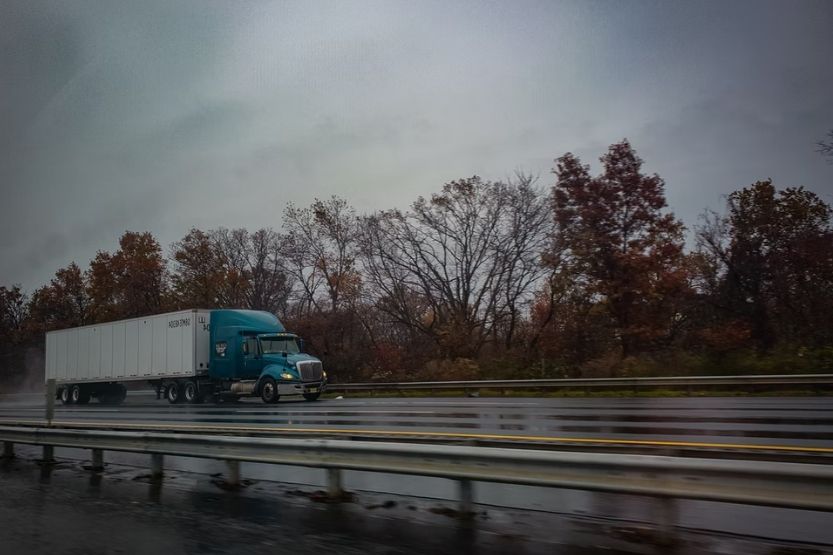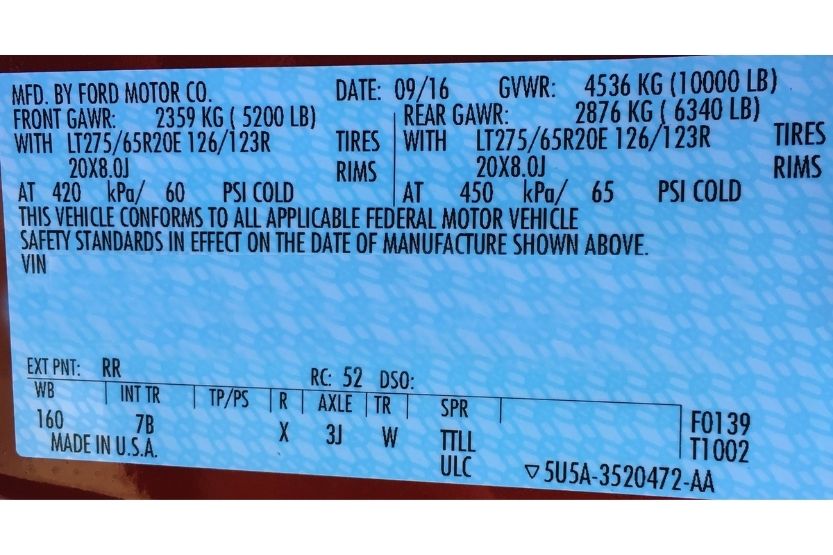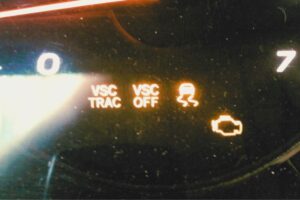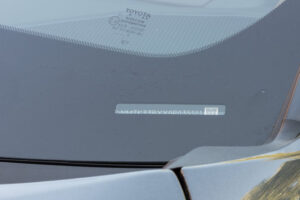Are you planning to head on vacation or a ferry trip? If so, you may be planning to bring your car or truck, and perhaps also a trailer. Before you set out on that journey, you should know more about the term GCWR (gross combined weight rating).
Also known as GCWR, the Gross Combined Weight Rating is the maximum allowable combined weight of your towing vehicle, the passengers inside, any cargo you may have onboard, along with the weight of the fully-loaded trailer. Essentially, the GCWR tells you how much weight the vehicle and trailer can safely handle when their capacities are maximized.
The GCWR is an important number for you to know if you’re planning on using your vehicle to lug around plenty of cargo. Failure to account for this vehicle’s property while making your preparations could ruin your plans.
Read on to learn more about gross combined weight rating and how you can pin down that number for the vehicle and trailer you’re using.
What Is GCWR?

The GCWR is what you get when combining the GVWR and the GTWR.
Why the Need for Weight Limits?
Weight limits are established for vehicles for two main reasons:
- Protect anyone using the vehicle in question: Continue using a vehicle that is lugging around too much weight, and you may lose control of it. An accident could occur because you ignored that you were over-burdening your vehicle.
- Prevent a Badly Damaged Vehicle: Controlling an overloaded vehicle is incredibly difficult. A crash is possible.
So, why are we talking about weight limits here? That’s because the GCWR essentially serves as the maximum weight limit if you’re towing something using your vehicle.
To better understand the concept of the GCWR, we can separate it into two main components:
- Gross Vehicle Weight Rating (GVWR)
- Gross Trailer Weight Rating (GTWR)
Gross Vehicle Weight Rating (GVWR)
Let’s start by discussing the GVWR in greater detail. The GVWR is an acronym for Gross Vehicle weight rating.
We can break the GVWR down further into three major elements:
1. Curb Weight
The curb weight refers to how much a specific vehicle weighs when carrying a full fuel tank and all the standard equipment pieces. Typically, the curb weight is in the vehicle manual. You can probably find it online if it is not in the manual.
2. Combined Weight of the Passengers
Next, we have the combined weight of the passengers. This is easy enough to determine as you can note the combined weight of everyone who will be in the car.
3. Cargo’s Combined Weight
The final component is the combined weight of your cargo. This weight includes the vehicle’s accessories and the baggage’s weight.
Gross Trailer Weight Rating (GTWR)
The GTWR, or Gross Trailer Weight Rating, is similar to the GVWR. To find out the GTWR of your trailer, you have to know the trailer’s weight and the maximum cargo weight it can hold. By the way, the weight of the trailer tongue is also included in the trailer’s weight.
The only difference between GTWR and GVWR is that you don’t have to include passenger weight for the former. You don’t need to do that because people typically don’t ride the trailer.
How Much Does a Ford Ranger Weigh (kg)?
How to Calculate Gross Combined Weight Rating (GCWR)?
There is no complex math involved if you want to figure out your GCWR while preparing for your trip. As long as you have the basic weight measurements for your vehicle and trailer, you should be able to identify the GCWR with no problem.
In formula form, that reads as GVWR + GTWR = GCWR.
What Is the Average Weight of a Pickup Truck?
How to Find the Gross Combined Weight Rating for Vehicle and Trailer?

Calculating for the GCWR is easy once you know which numbers to use. There are also easier ways to find the GCWR for your vehicle and trailer.
Check Inside the Vehicle’s Door Frame
Many manufacturers indicate the GCWR of the vehicle and trailer inside the door frame of the vehicle. You can see the GCWR within a label printed near the latches.
Consult the Manual
If you cannot find the GCWR inside your vehicle, you can still turn to the provided owner’s manual. That manual contains all kinds of important details, and the GCWR should be one of them.
Search for the Vehicle’s GCWR Online
Unfortunately, not everyone is good at holding on to their car manuals, so looking for the GCWR, there may not be an option for you. Faced with that issue, you can still search for the GCWR online.
Hopefully, you will find the GCWR for your car and trailer online.
Contact the Dealership
As a last resort, you can contact the dealership where you purchased the car from. Ask them about the GCWR. They should be able to provide you with the answer.
Again, what is GCWR? The Gross combines vehicle weight rating (GCWR) is the maximum allowable combined weight of the vehicle, trailer, cargo, and passengers. You can also refer to GCWR as the Gross Combined Vehicle Weight Rating or GCVWR.
How Much Does a Semi-truck Weigh Without the Trailer?
Why Is It Important to Know a Vehicle’s Gross Combined Weight Rating (GCWR)?

The GCWR indicates the maximum combined capacity of the vehicle and trailer you’re planning to use. We already know how to calculate it, but you may wonder why knowing it is so important.
Knowing only the GCWR is not enough. To steer clear of potential trouble, you need to know the maximum weight of your car, the trailer, your cargo, and your passengers about the GCWR.
You must stay under the GCWR to avoid potential mishaps while driving to your destination. The dangers of being on the road when you’ve exceeded the GCWR are very real. We’ve detailed what could go wrong if you ignore the GCWR in the section below:
1. Hard to Control Overloaded Vehicle
Vehicles and trailers with heavy loads are hard to control. Still, you should be able to manage as long as you drive your burdened vehicle and trailer carefully. You can avoid mishaps by practicing defensive driving.
Things become more complicated if you exceed the GCWR threshold.
Since your vehicle is overloaded, it becomes harder to stop. The excessive amount of weight can cause your vehicle to nudge forward still even after you hit the brakes. Even navigating a corner turns into a difficult task with all that weight your vehicle carries around.
It’s not hard to imagine how bad things could turn out if you don’t have complete control of your vehicle and trailer. Don’t exceed the gross combined weight rating of your vehicle set up so you can steer clear of that problem.
2. Brakes May Fail
The entry above touched on what could happen if you hit the brakes while driving a vehicle setup that has exceeded its gross combined weight rating. We noted that excessive weight could keep your car in motion.
Notably, that’s still not the worst thing that can happen when you hit the brakes.
Placing too much strain on the brakes can cause them to overheat. If that happens, you probably won’t be able to use your brakes until you get them repaired.
Driving on the road with no brakes is a nightmare scenario. Heed the GCWR, so you don’t have to worry about that.
Installing some trailer brakes is also a good idea if you’re brushing close to the GCWR for your setup. Those supplemental pieces of equipment can help keep your trailer moving in conjunction with your vehicle.
3. Blow Out Tires
Don’t disregard the amount of damage you could do to your tires by ignoring the gross combined weight rating. Tires that are being asked to support too much weight could blow out. They could blow out while you’re in the middle of the road.
Carrying a spare tire is not a good enough solution for that problem. You should avoid driving your overloaded vehicle altogether to stay safe.
4. Possible Damage to Other Car Parts
Your brakes and tires are not the only parts of your vehicle that could sustain damage if you ignore the gross combined weight rating.
Parts of the trailer may break because they are exposed to excessive strain. They could break at any moment, and your trailer could crash as a result.
As for your vehicle, you have to worry about your engine and transmission. Straining these parts can lead to overheating. Those components of your vehicle may stop working once they overheat.
The odds of you successfully reaching your destination while using a vehicle setup that has exceeded its GCWR is low. Even if you manage to reach your destination somehow, your vehicle and trailer will likely sustain significant damage along the way.
How Much Does A Smart Car Weigh? [Smart Car Weight]
Does Gross Combined Weight Rating (GCWR) Have Any Commercial Importance?
Knowing the gross combined weight rating for your vehicle configuration is important, not just if you’re traveling for leisure. It’s also something you must be constantly aware of if you own a business that deals in moving heavy cargo.
The important thing to remember for business owners is that a normal driver’s license is no longer enough once the GVWR and GCWR exceed certain points. The person operating the vehicle may instead need a commercial driver’s license.
According to the Federal Motor Carrier Safety Administration, drivers must have at least a Class A commercial driver’s license if their vehicle configuration has a GCWR of 26,001 pounds or more and a GTWR of over 10,000 pounds.
Meanwhile, a Class B commercial driver’s license is required if the GVWR of the truck is 26,001 pounds or more with no trailer attached. A Class B commercial driver’s license is still needed if the truck’s GVWR is over 26,001 and the GTWR is 10,000 pounds or less.
Conclusion – What Is GCWR? [GCWR Meaning and How to Calculate]
Safety should always be your priority when you’re hitting the road. Sometimes, the way to stay safe on the road involves traveling lighter.
Hopefully, you understand just how vital a statistic gross combined weight rating is. It could be the difference between a safe journey and a troubled one. Always be aware of it when you’re planning to travel, and you should have nothing to worry about.
Remember that there is an easy way to determine if you’re not exceeding your vehicle’s Gross Combined Weight Rating (GCWR). After some simple math, you should have the information you need. That vital piece of information can keep you and your family safe while traveling.
Read next:









